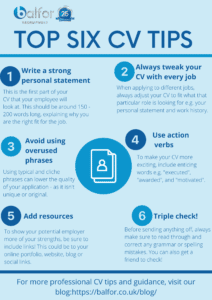How To Build a Professional Nurse CV
[vc_row type=”in_container” full_screen_row_position=”middle” scene_position=”center” text_color=”dark” text_align=”left” overlay_strength=”0.3″ shape_divider_position=”bottom”][vc_column column_padding=”no-extra-padding” column_padding_position=”all” background_color_opacity=”1″ background_hover_color_opacity=”1″ column_shadow=”none” column_border_radius=”none” width=”1/1″ tablet_text_alignment=”default” phone_text_alignment=”default” column_border_width=”none” column_border_style=”solid”][vc_column_text]
Here’s how to efficiently build a professional nurse CV: Your one-stop shop for tips and guidance
Are you a nurse and are you unsure how to construct a professional CV? You’ve come to the right place!
Let’s start with the beginning! A personal statement should always be included at the top of your nursing CV. This should be a fairly short section that summarises everything you’ve done so far in your nursing career. If you have specific expertise in any branch of nursing, this is the perfect place to advertise this!
Your nursing history/work experience is vital to include in a professional nurse CV. Always start with the most recent job and chronologically work your way back. Also, it’s useful to add any additional information on the types of units you’ve worked in e.g. the unit type with each job.
Another important section is your education history, as well as highlighting any practical training or placements. If you have completed a nursing degree or any specialist qualifications, this is where you detail where and when you achieved this.
A skills and achievements section is next, mentioning anything relevant that might help you stand out to potential recruiters. This is the ideal section where you mention any achievements you’ve accomplished throughout your nursing career e.g. have you managed a unit’s budget or have you supervised patients on a large ward?
Some skills that look good on a nursing CV could be:

- Staying patient in stressful environments
- Time-efficient
- Quick response time
Any additional information can be added towards the bottom of the CV. This could be other relevant certificates e.g. you’re bilingual or have any experience volunteering. Mentioning hobbies like meditation or psychology could be useful on a nursing CV and help you stand out from the crowd.
Finally is the references section. Always list two references for a clinical CV like nursing, with one being your current employer and the other either a recent employer/tutor/lecturer or placement leader.
At Balfor, our Healthcare team understands how it might be a struggle for newly qualified nurses when writing a CV.
Rather than dedicating most of your CV towards experience, emphasise all of your skills and achievements throughout college. Your CV structure may look like this;
- Education; certifications, relevant modules, and achievements
- Key skills
- Work experience e.g. volunteering
- Interests
There are a few features you should avoid when creating your nursing CV:
- Your CV should not be longer than two A4 pages long
- Don’t rely on only you proofreading your CV. Make sure to use Grammarly or have a friend or relative check it over.
- It’s important to use action words to liven up your CV.
- Don’t hold back from using nursing jargon.
- Don’t include irrelevant information or past jobs that don’t have relevance e.g. sales assistant.
If you’re interested in applying for a nursing position, we have a range of roles available to apply for: https://balfor.co.uk/healthcare-jobs/ or call 0121 260 0002[/vc_column_text][/vc_column][/vc_row][vc_row type=”in_container” full_screen_row_position=”middle” scene_position=”center” text_color=”dark” text_align=”left” overlay_strength=”0.3″ shape_divider_position=”bottom”][vc_column column_padding=”no-extra-padding” column_padding_position=”all” background_color_opacity=”1″ background_hover_color_opacity=”1″ column_shadow=”none” column_border_radius=”none” width=”1/1″ tablet_text_alignment=”default” phone_text_alignment=”default” column_border_width=”none” column_border_style=”solid”][nectar_btn size=”large” open_new_tab=”true” button_style=”regular” button_color_2=”Accent-Color” icon_family=”none” url=”https://balfor.co.uk/healthcare-jobs/” text=”Apply Now!”][/vc_column][/vc_row]
